 Petzlover
Petzlover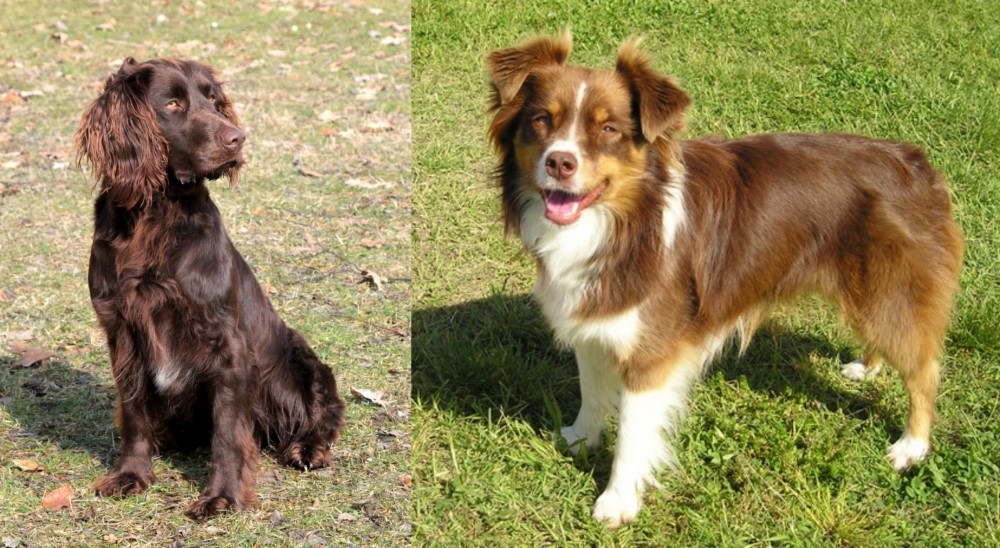 German Spaniel is originated from Germany but Miniature Australian Shepherd is originated from United States. German Spaniel may grow 8 cm / 4 inches higher than Miniature Australian Shepherd. German Spaniel may weigh 9 kg / 20 pounds more than Miniature Australian Shepherd. Both German Spaniel and Miniature Australian Shepherd has almost same life span. German Spaniel may have less litter size than Miniature Australian Shepherd. Both German Spaniel and Miniature Australian Shepherd requires Moderate Maintenance.
German Spaniel is originated from Germany but Miniature Australian Shepherd is originated from United States. German Spaniel may grow 8 cm / 4 inches higher than Miniature Australian Shepherd. German Spaniel may weigh 9 kg / 20 pounds more than Miniature Australian Shepherd. Both German Spaniel and Miniature Australian Shepherd has almost same life span. German Spaniel may have less litter size than Miniature Australian Shepherd. Both German Spaniel and Miniature Australian Shepherd requires Moderate Maintenance.
 Looking like a smaller version of the Red Setter, the German Spaniel, known also as the Deutscher Wachtelhund or German Quail Dog, hails from Germany.
Looking like a smaller version of the Red Setter, the German Spaniel, known also as the Deutscher Wachtelhund or German Quail Dog, hails from Germany.
It isn't a new dog breed and in fact it was developed around 1890 already. Used as a hunting dog, the German Spaniel isn’t well known outside of Germany, but it was recognized by the United Kennel Club in 1996.
There are a number of breeds which feature in the development of the German Spaniel, and one of the more prominent dog breeds used for the modern day German Spaniel is the extinct Stoeberer. The Stoeberer was crossed with water dogs and sporting spaniels to bring about the modern German Spaniel as we know it today.
It was in 1903 that the dog was recognized as a breed, and in the 1960s and 1970s the dogs were imported into the United States.
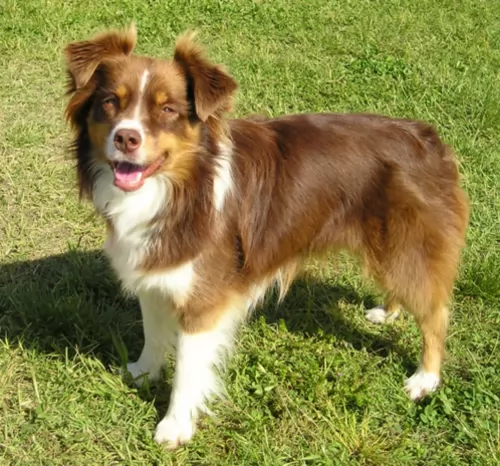 Unlike some miniaturized pure dog breeds, the Miniature Australian Shepherd is a breed of its own. The American Kennel Club and the United Kennel Club recognize that the miniature Australian Shepherd is the same as the miniature American Shepherd.
Unlike some miniaturized pure dog breeds, the Miniature Australian Shepherd is a breed of its own. The American Kennel Club and the United Kennel Club recognize that the miniature Australian Shepherd is the same as the miniature American Shepherd.
Certain breeding programs to develop the Miniature Australian Shepherd have been established and this dog is a small version of the Australian Shepherd. You can say that the Mini Australian Shepherd was developed in the 1960s and hails from the USA. American ranchers bred small Australian Shepherd dogs to create smaller replicas of the breed.
 As a medium-sized, muscular dog which stands at roughly 45cm to 54cm in height and weighs 18 – 25kg, the German Spaniel is a sporty gun dog who has a long back in relation to his height.
As a medium-sized, muscular dog which stands at roughly 45cm to 54cm in height and weighs 18 – 25kg, the German Spaniel is a sporty gun dog who has a long back in relation to his height.
The ears are long and floppy with wavy or curly hair that will need to be attended to so as to avoid matting.
He has a long, wavy or curly weather-resistant coat, being short on the head but with feathering around the legs and stomach. Color of the coat includes brown, reddish brown and white. The white markings can be found on the chest of the dog, the legs, tails and muzzle. `
The German Spaniel loves to work and be busy and if he can be included in his human family’s activities, then so much the better. He is a social dog and gets on well with other dogs as well as children in the home. The German Spaniel is an intelligent dog and easily trained. In fact training and socialization are important for him, making him obedient and a pleasure to have around.
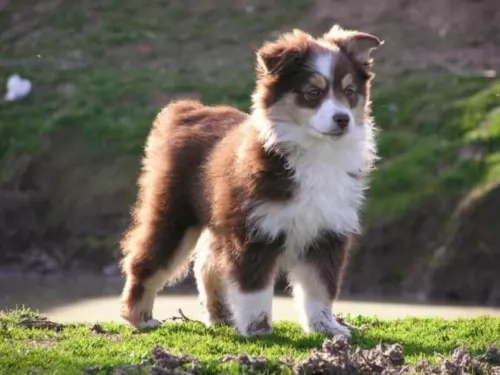 The Miniature Australian Shepherd’s coat is medium-length and is straight or wavy. It comes in a range of colors such as blue or red merle and red or black tricolor. There are white or tan markings as well. He is a small dog, standing at 33 - 46 cm in height and weighing 6 – 16kg.
The Miniature Australian Shepherd’s coat is medium-length and is straight or wavy. It comes in a range of colors such as blue or red merle and red or black tricolor. There are white or tan markings as well. He is a small dog, standing at 33 - 46 cm in height and weighing 6 – 16kg.
They have blue or brown eyes but some will even have one eye blue and the other brown. The ears are semi erect, semi floppy and the tail, while essentially left long and feathery, is sometimes docked.
Miniature Australian Shepherds are easygoing dogs who love being with their human families. They get on well with children in the home and are always willing to jump right in for a game.
They’re lively and agile and if its not games they’re busy with, they want to be on a walk. They’re loving and loyal and also eager to please, sensing what their owner wants.
They’re intelligent dogs too and easy to train so it is sure to go well with training and socialization, which is important for any dog. This training and socialization can actually help with problems a dog has such as being very nervous or being too active indoors. They become obedient and manageable wherever they are.
He is also willing to get on with other pets in the house. Just like the larger dog, the mini Australian Shepherd loves to be active and at work.
 The German Spaniel makes a wonderful family pet. He is friendly and sociable, getting along well with just about all dogs and people. He loves his human family, wanting to be involved in all their activities.
The German Spaniel makes a wonderful family pet. He is friendly and sociable, getting along well with just about all dogs and people. He loves his human family, wanting to be involved in all their activities.
He is an active dog, used to hunting and being outdoors and he will therefore require a good deal of exercise from his owners, otherwise he becomes bored and frustrated and even destructive.
He is an adaptable dog, living in the city or the countryside, but wherever he is, exercise is important. Docile and non-aggressive, he has got all the characteristics that make him a splendid family pet.
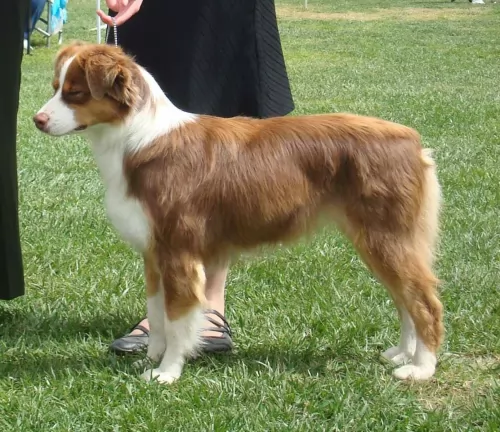 The wonderful friendly nature’s of these dogs make them excellent family pets, especially when they have been trained and socialized. They can live in the city or country but they will certainly require being exercised as they are an active breed, wanting to be busy with his human family.
The wonderful friendly nature’s of these dogs make them excellent family pets, especially when they have been trained and socialized. They can live in the city or country but they will certainly require being exercised as they are an active breed, wanting to be busy with his human family.
You can’t describe these dogs as low maintenance as they have long, thick hair that sheds and which will also need to be brushed regularly.
If you’re able to provide a good home for this beautiful, lively dog, then he will make you a splendid pet.
 Health problems are fairly unknown with the robust German Spaniel, and if well cared for, he can reach 12 to 15 years of age.
Health problems are fairly unknown with the robust German Spaniel, and if well cared for, he can reach 12 to 15 years of age.
There are always one or two hereditary health concerns, and the health issues that affect the breed the most are hip dysplasia, skin allergies and splayed feet.
The American Kennel Club tells us that this type of foot is flat, with spreading toes. It is a fault in your pet because it doesn’t support his weight well, causing health problems later on for your pet. This is why it is so important to have your pet’s nails clipped from time to time, because long nails can turn a good paw into a splayed one, actually injuring the tendons.
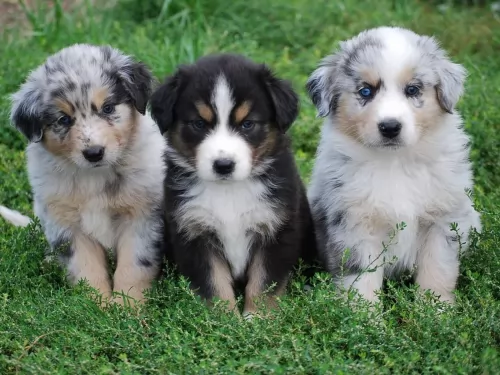 Your Miniature Australian Shepherd can enjoy good health if you make sure he has a nutritious diet, he is well exercised and he is happy and content because of the attention you give him. He can easily reach 13 years of age.
Your Miniature Australian Shepherd can enjoy good health if you make sure he has a nutritious diet, he is well exercised and he is happy and content because of the attention you give him. He can easily reach 13 years of age.
Also, say what you like, human beings constantly tampering with animals to produce certain looks has its drawbacks and can create health problems in dogs.
As a pure breed however, these dogs will be more susceptible to some common canine health problems such as hypothyroidism, patellar luxation, obesity, hip dysplasia, vision problems and cancer.
 Shedding quite heavily and seasonally, the German Spaniel’s thick coat will require being brushed twice a week to keep it shiny and healthy. He loves the attention you give him at the same time.
Shedding quite heavily and seasonally, the German Spaniel’s thick coat will require being brushed twice a week to keep it shiny and healthy. He loves the attention you give him at the same time.
There are some German Spaniel owners who like to take their dogs in for professional grooming, requesting that the coat be cut short all round.
The long ears of your German Spaniel, especially if your pet spends a lot of time swimming, can be permanently damp, picking up dirt easily. Check inside the ears and make sure they are dry and clean to prevent ear infections.
Make sure to brush his teeth 2 or 3x a week as well because plaque build up leads to dental disease but it also negatively affects other body organs too, shortening your pet’s life.
Every dog, just like any human being, requires good nutrition, fresh water and warm, dry sleeping facilities to remain happy and to give him a good chance at longevity.
Apart from the very best commercially manufactured dog foods, ensure he occasionally gets some raw meat in as well as some cooked brown rice, vegetables and chicken. These can be added into his kibble.
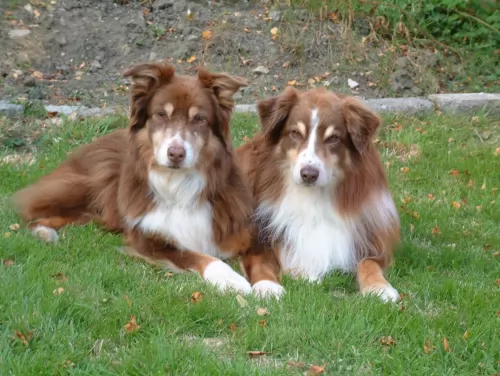 The mini Australian Shepherd has a long coat with seasonal shedding. You will need to give the coat a good brush twice a week to keep it untangled and to remove loose hair.
The mini Australian Shepherd has a long coat with seasonal shedding. You will need to give the coat a good brush twice a week to keep it untangled and to remove loose hair.
Other grooming for your pet will be to check his eyes and ears for infection, check for unusual lumps when you brush him and check for fleas and ticks. Keep his nails trimmed and brush his teeth 2 or 3 times a week to avoid plaque build up.
If you’re wondering how to keep your dog well groomed for the enhancement of this health, people such as your vet or professional groomers will do these grooming tasks for you.
Top quality commercially manufactured dog food packed with vitamins and minerals needs to be your choice if you're going to be using these dog foods. Avoid the cheaper brands that use lots of fillers, sugar, salt, colorants and preservatives.
Home-made food is a wonderful treat for a dog and delicious, nutritious and simple ingredients such as boiled chicken, brown rice or pasta and some cooked vegetables chopped up into his dry kibble from time to time will do him wonders.
Sometimes it will also be good to add in a little bit of raw meat too. Make sure there is a bowl of fresh, cool water available to your pet constantly.